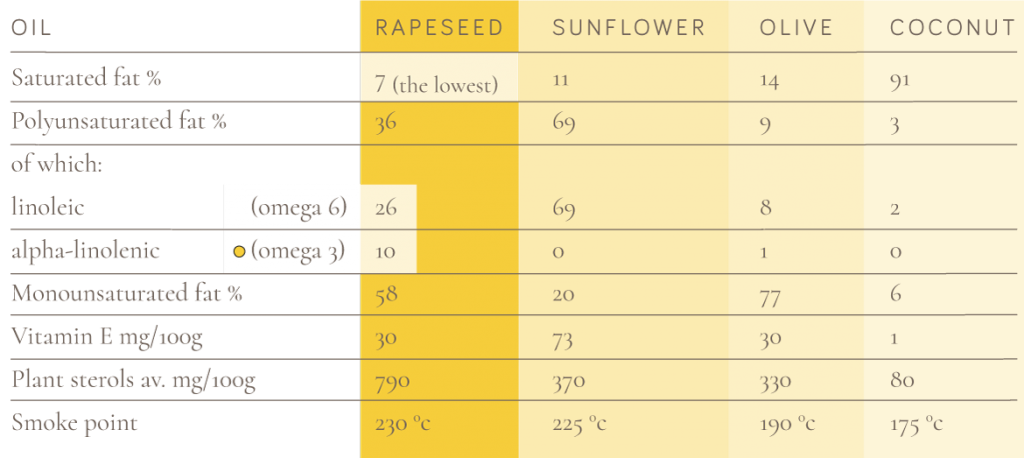Did you know that cold pressed rapeseed oil is a great, heart-happy oil? Are you looking to improve your health? Well we have one simple change for you that will help you with this goal. Mellow Yellow Cold Pressed Rapeseed Oil is a brilliantly healthy, British cooking oil that is grown, pressed and bottled in Northamptonshire. Read on to find out more about all the fantastic health benefits of cold pressed rapeseed oil…
Top 4 Health Benefits of Cold Pressed Rapeseed Oil
Low saturated fat
A balance of Omega 3 and Omega 6
Contains Vitamin E
Naturally occurring plant sterols
Low saturated fat
Saturated fat is usually found in high levels in fatty meats, full fat dairy products, coconut oil and lard. For many years, health professionals have advised against consuming high amounts of saturated fat as they have been shown to raise your LDL (Low Density Lipoprotein) levels. LDL is known as ‘bad’ cholesterol as high levels of LDL blood cholesterol increases the risk of heart disease by building up in our arteries and causing them to narrow. Cold pressed rapeseed oil, however, has very low levels of saturated fat. This is one of the major health benefits of cold pressed rapeseed oil! For more information from the British Heart Foundation, click here.
A balance of Omega 3 & Omega 6
Mellow Yellow Cold Pressed Rapeseed Oil contains both Omega 3 and Omega 6. These are essential fatty acids that the body is unable to produce itself so we need to ensure that we consume these in our diet. These two essential fatty acids contribute to brain development, growth and maintaining a healthy immune system. It is important that we consume these two fatty acids in the correct ratio as found in cold pressed rapeseed oil. It is this ratio that makes this one of our top health benefits of cold pressed rapeseed oil. We have more information on Omega 3 and 6 on our Health and Nutrition page.
Contains Vitamin E
Another of the health benefits of cold pressed rapeseed oil is that it contains vitamin E. Vitamin E occurs naturally in cold pressed rapeseed oil and is needed for a strong immune system and healthy eyes and skin.
Naturally occurring plant sterols
Last but not least in our top health benefits of cold pressed rapeseed oil are the naturally occurring plant sterols found in this brilliant oil. Plant sterols are fat-soluble compounds found in some vegetables, nuts and seeds, including rapeseed. They are similar in structure to cholesterol therefore when eaten, plant sterols compete with cholesterol for absorption into the bloodstream. Our bodies find it easier to absorb plant sterols as they block the cholesterol from being absorbed. This results in the cholesterol passing through and out of the body via the stool. Find more information here.
Comparison of oils:
With these brilliant health benefits of cold pressed rapeseed oil, it’s easy to see why so many people are swapping to Mellow Yellow Rapeseed Oil! Find out where to buy here.
If you want to know more about cold pressed rapeseed oil, how we produce it, how it grows, the simple way we press the seeds to produce our cold pressed rapeseed oil and more on what is so special about cold pressed rapeseed oil, have a look at this article!
For recipe inspiration on what to cook with cold pressed rapeseed oil, visit our Recipe page here.
Although sugars have been stealing a lot of media coverage recently, it is still important to think about the amount and type of fats in your diet in relation to weight gain and health.
The following article by the British Nutrition Foundation explains why Mellow Yellow is a great source of the ideal type of fat we should be including in our diet.
What is fat?
Fat is a macronutrient (like protein and carbohydrate) and is made up of fatty acids. Fatty acids can be classified as saturated or unsaturated depending on their chemical structure. Unsaturated fatty acids include monounsaturated fatty acids and polyunsaturated fatty acids. All fats provide 9 calories (kcal) per gram, which is more than double the number of calories provided by each gram of protein and carbohydrate that we eat (4 kcal per gram each). A high fat diet can, therefore, lead to weight gain over time.
Why do we need it?
Fat is a good source of energy and we need some of it in our diets to help our bodies to absorb the fat-soluble vitamins A, D, E and K. Within the body, fatty acids form an integral part of our cell membranes, helping to insulate and protect our internal organs, maintaining our body temperature and is involved in lots of body processes such as the development of our brains and the communications which occur between different cells. Cholesterol is needed to produce bile acids, which help us to digest food, and also some of our hormones.
We are able to synthesise most of the specific fatty acids we need apart from two polyunsaturated fatty acids – alpha linolenic acid (an omega 3 polyunsaturated fatty acid) and linoleic acid (an omega 6 polyunsaturated fatty acid). Your body needs these for brain development, growth and for a healthy immune system. They are described as ‘essential fatty acids’ as we need to obtain small amounts from our diet. Alpha-linolenic acid is found in rapeseed, walnut and soya oils and spreads made from these. Linoleic acid is also found in plant-based oils such as sunflower, corn, peanut, rapeseed, olive, safflower, sesame, walnut and soya oil and spreads made from these. Both of the essential fatty acids are present in smaller amounts in foods such as meat, eggs and oily fish.
How much fat should we be eating?
UK dietary guidelines recommend that adults consume no more than 35% of the energy from their foods from fat. This equates to roughly 90g of fat per day for men and 70g for women. Our fat intake in the UK has been falling since the 1960s and, on average, we are now eating around these amounts. While low-fat diets were promoted in previous years, diets containing a moderate amount of fat can be easier to adhere to. So while it is important to try to cut down your total fat consumption, if you are struggling to do this, focus on choosing healthier types of fat.
Saturated fat intake should be restricted to no more than 11% of food energy, which equates to roughly 30g for men and 20g for women, per day. This is because a high intake of saturated fat has been linked to high blood cholesterol, which is a well-known risk factor for heart disease. Aim to replace saturated fat in your diet with small amounts of unsaturated fats by opting for foods rich in unsaturated fats or complex carbohydrates such as wholegrain foods.

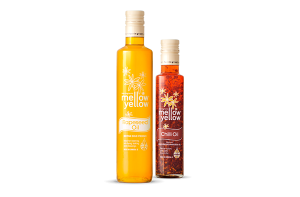 Oils
Oils Rapeseed Oil
Rapeseed Oil Chili Oil
Chili Oil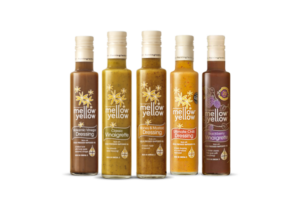 Dressings
Dressings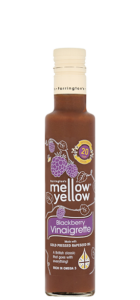 Blackberry Vinaigrette
Blackberry Vinaigrette Classic Vinaigrette
Classic Vinaigrette Balsamic Dressing
Balsamic Dressing Honey & Mustard
Honey & Mustard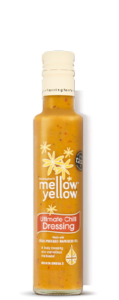 Ultimate Chilli Dressing
Ultimate Chilli Dressing